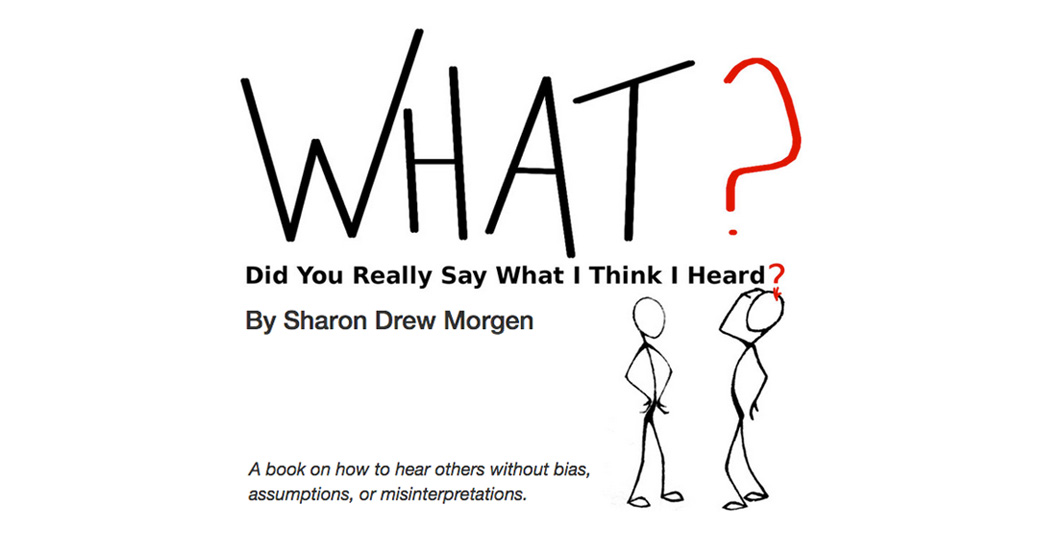Our Brains Bias What We Hear
 I got to the gym yesterday only to find that my regular treadmill had been replaced by a new-fangled computer machine. I asked the young woman next to me how to start the damn thing as it wasn’t obvious. Here was the conversation:
I got to the gym yesterday only to find that my regular treadmill had been replaced by a new-fangled computer machine. I asked the young woman next to me how to start the damn thing as it wasn’t obvious. Here was the conversation:
SDM: Where’s the start button on this thing?
Woman: Over there. You’ll want to start on 2.3 miles and…
SDM: Thanks for showing me. I’m good now. Thanks.
Woman: You’re starting too high! Plus, you’ll want to put it at an incline of 1% to start, then …
SDM: No. Really. I’m good.
Woman: I’m telling you the right way to do this! I’m a professional trainer! I know what I’m talking about!
SDM: I’m sure you do. But I’m good. Thanks.
Woman: What’s your problem, lady??? You asked me for my advice! I’m just responding to your question! I’M A PROFESSIONAL!
That woman converted my simple request into a request for her expertise and she couldn’t hear my attempt to disengage from the conversation – three times! But we all do this sort of thing. And it’s our brain’s fault.
BIASES
Far too often, we interpret what someone says with the filters of what we’re listening for and end up limiting the scope of what’s possible. We actually inadvertently restrict our listening in most conversations as our unconscious biases filter out what doesn’t match. Let me introduce you to some of the more common ones out of the hundreds of recognized biases:
Confirmation bias: we listen to get personal validation, often using leading questions, to confirm to ourselves that we’re right; we seek out people and ideas to confirm our own views and maintain our status quo, and unwittingly mistranslate what’s been said according to our beliefs.
Expectation bias: we decide what we want to take away from a conversation prior to entering, causing us to only notice the bits that match and disregarding the rest; we mishear and misinterpret what’s said to conform to our goals.
Status quo bias: we listen to confirm that we’re fine the way we are and reject any information that proves us wrong.
Attention bias: we unconsciously ignore what we don’t want to hear – and often don’t even hear, or acknowledge, something has been said.
Information bias: we only gather the information we’ve deemed ‘important’ to push our own agendas or prove a point. When used for data analysis, we often collect information according to expectation bias and selection bias. (This biases scientific and social research, and data analysis.)
And of course, we all have a Bias Blind Spot: we naturally believe we’re not biased! And anyone that doesn’t believe we’re Right is Wrong.
OUR BRAINS BIAS AUTONOMOUSLY
When researching my book on how to close the gap between what’s said and what’s heard, I discovered that our brains only allow us to understand a fraction of what others mean to convey (Note: the fraction depends on familiarity, triggers, history, beliefs, etc.).
Here’s what happens: Sound enters our ears as puffs of air (literally!) that get turned into signals that then seek out similar-enough circuits that will translate the incoming signals as per the content already there (i.e. subjective, biased, restricted to what we already know).
The bad news is that where the incoming signals don’t match the old circuits, our brains discard what doesn’t match – and doesn’t tell us what it has discarded! And we’re left ‘hearing’ what our brains tell us – some fraction of what was said! So the woman in the opening story actually heard me ask her for advice.
I believe our success is regulated by our listening biases and our ability – or not – to recognize when/if our biases are getting in the way (I wrote a chapter in What? that offers a skill set on how to do this). Certainly our creativity and opportunities, our choices of jobs, mates, friends, etc. are restricted. The natural biasing we do is compounded by the tricks our brains play with memory and habit, making the probability of factual interpretation pretty slim.
If we can avoid the trap of assuming what we think has been said is accurate, and assume that some portion of what we think we heard might contain some bias, we could take more responsibility for our conversations.
- At the end of each conversation, we’d check in with our Communication Partner and get accuracy agreement.
- Whenever we hear something that sounds like an agreement or a plan, we’d stop the conversation to check that what we think we heard is accurate.
- At the end of meetings, we’d check in that our takeaway plans and their outcomes are agreeable.
- When we hear something ‘different’ we won’t assume the other person wrong, but consider the possibility that we are the ones who heard it wrong.
Knowing the difference between what we think others are saying vs what they actually mean to convey takes on great importance in meetings, coaching calls, negotiations, doctors, and information collection for decision analysts.
Let’s get rid of our egos. Let’s put our need to collaborate, pursue win/win communication, and authentic Servant Leadership into all our communication. Otherwise, we’re merely finding situations that maintain our status quo. And we lose the opportunity to be better, stronger, kinder, and more creative.
________
Sharon-Drew Morgen is a breakthrough innovator and original thinker, having developed new paradigms in sales (inventor Buying Facilitation®, listening/communication (What? Did you really say what I think I heard?), change management (The How of Change™), coaching, and leadership. She is the author of several books, including the NYTimes Business Bestseller Selling with Integrity and Dirty Little Secrets: why buyers can’t buy and sellers can’t sell). Sharon-Drew coaches and consults with companies seeking out of the box remedies for congruent, servant-leader-based change in leadership, healthcare, and sales. Her award-winning blog carries original articles with new thinking, weekly. www.sharon-drew.com She can be reached at sharondrew@sharondrewmorgen.com.
Sharon Drew Morgen October 25th, 2021

